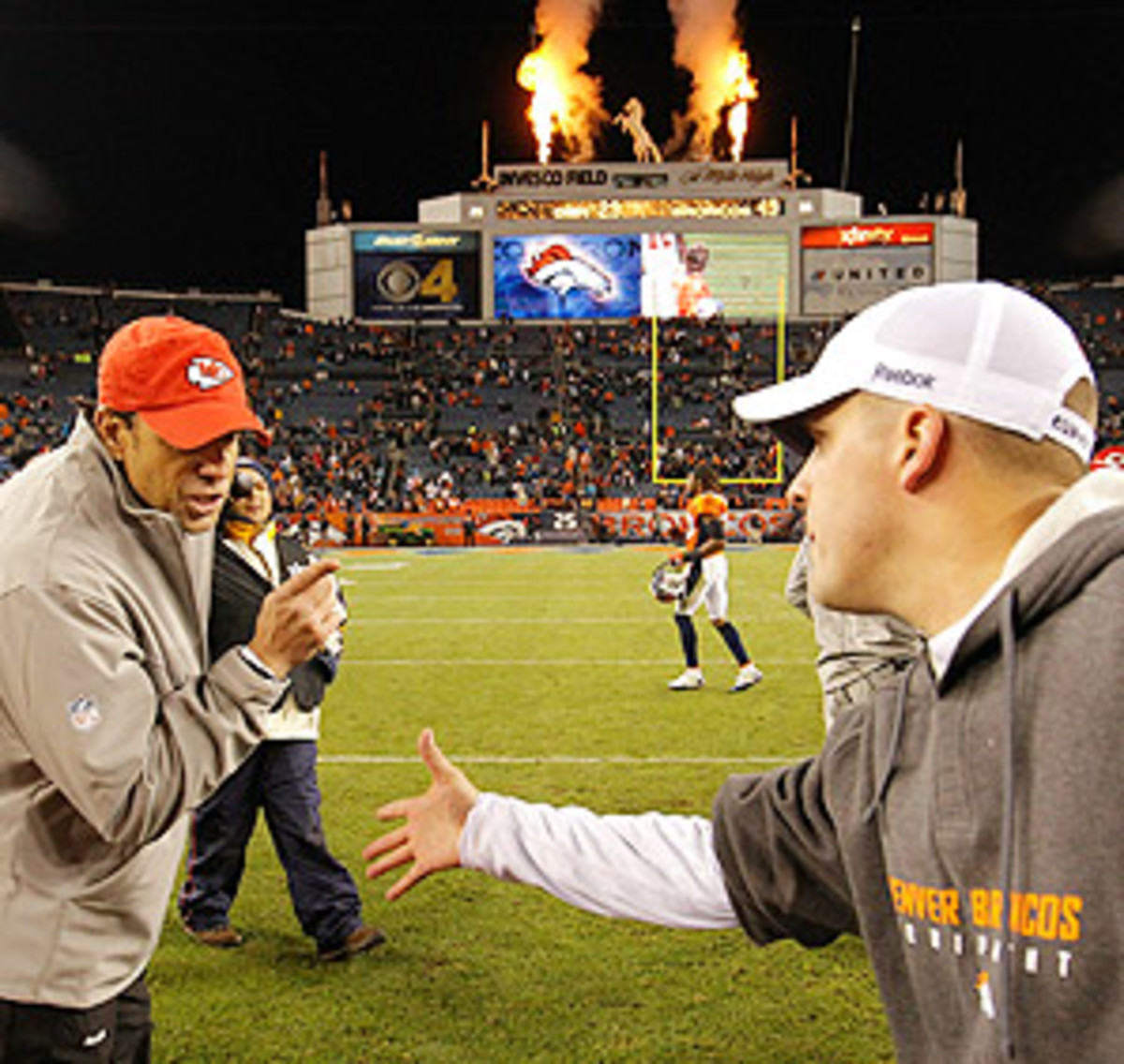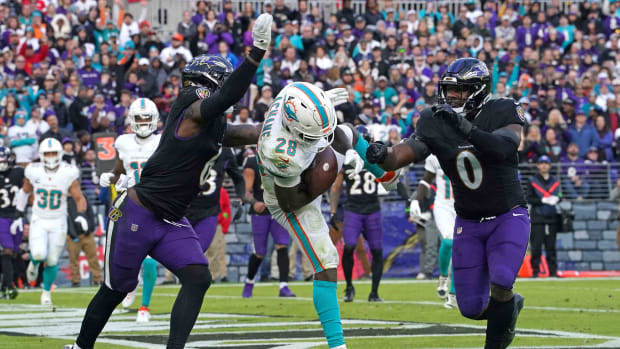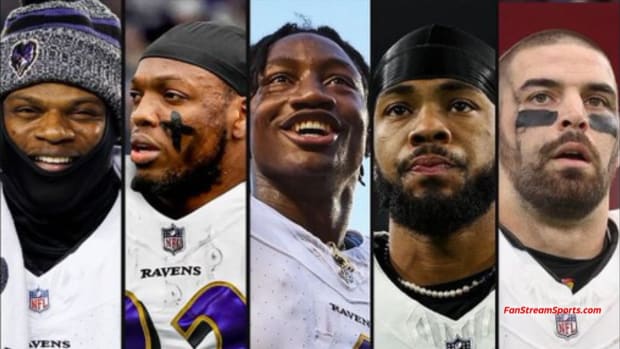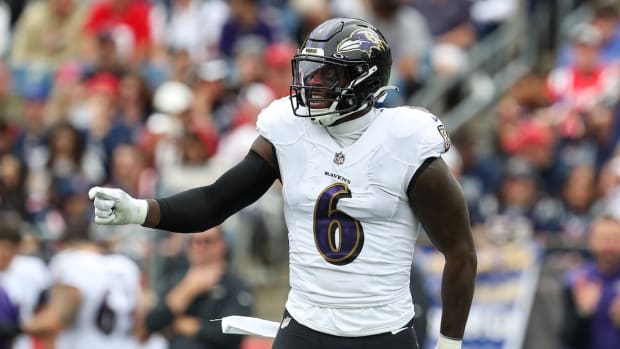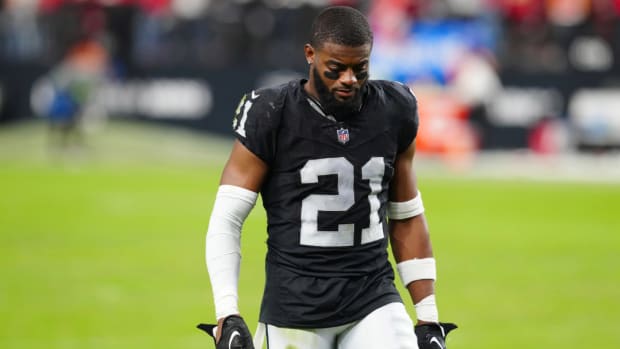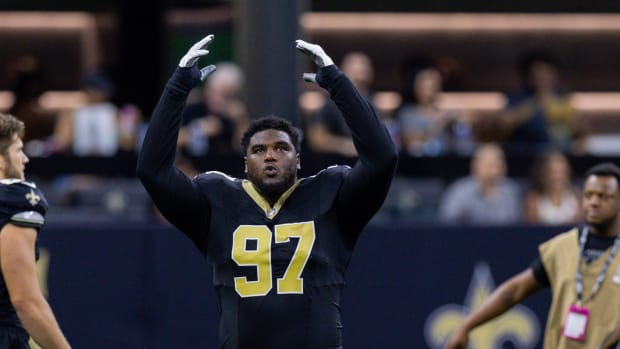When it comes to running up the score, there's no etiquette in NFL
Is there any etiquette in the NFL when it comes to the scoreboard?
Haley clearly thought so then, and his snub of McDaniels' offer of a postgame handshake left the topic hanging out there -- like the empty right hand of the Broncos youthful head coach -- for the rest of us to mull over in the wake of Denver's 49-29 thumping of first-place Kansas City. At least until Haley issued an apology to McDaniels and Broncos fans the very next day, calling his move "not right,'' and admitting he let his emotions get the best of him.
Haley this week refused to elaborate on what exactly set him off in the course of Denver's 20-point home win, but the facts are these: The last-place Broncos raced to a 35-0 lead in the middle of the second quarter, and were then outscored 29-14 by the Chiefs over the course of the game's final 2½ quarters. It's tough to make a case that Denver ran up the score, but clearly sometimes the blowout is in the eye of the beholder.
These things almost always have a little history to them, and it's probably instructive to remember that in Week 17 of last season, with the swooning Broncos fighting for their lives in the AFC wild-card playoff race, Haley and his 3-12 Chiefs came into Denver and administered a 44-24 beat-down (yep, by that same 20-point margin), snuffing out Denver's postseason hopes at 8-8.
Chiefs running back Jamaal Charles ran for a franchise-record 259 yards that day, and Kansas City's 317 yards rushing were the fourth-highest total in team history. But it was a 27-24 Chiefs lead after three quarters, so there was no notion of K.C. running up the score when it hung another 17 points on the board in the final quarter.
In talking this week to a collection of sources that included a former NFL starting quarterback, an ex-NFL head coach and a current club front-office executive, I found little support for the idea of an unwritten mercy rule in the league. Even though all of them made a distinction of sorts between the standards that are accepted in the NFL game, compared to the college game, where questions have arisen this season about teams potentially running up the score (see Wisconsin 83, Indiana 20 last Saturday in Madison).
"It's a worn-out statement, but it's true: The NFL is a big-boy league and you just deal with it,'' said Trent Dilfer, the ex-NFL quarterback and current ESPN analyst. "You don't feel sorry for anyone. Feelings don't matter in the NFL. You don't get many opportunities to be on your 'A' game in the NFL, so you score as many touchdowns as you can. You have to remember that you're also putting stuff on tape for the other teams you haven't played yet to worry about.
"It's beyond being just a game. There are very few unwritten rules in the NFL, and the ones there all have to do with player safety and being professional, and not holding back the dogs when you're ahead. When you're beating someone bad, you're less concerned with their feelings and more concerned with the risk of getting your guys hurt.''
Clearly revenge might have been on Denver's mind last week, but that's not the same as pouring it on in an attempt to add a level of insult to the Kansas City defeat. The Broncos did the vast majority of their damage in the first half, and their second-half play-calling did not suggest they were trying to inflict maximum pain on the Chiefs. They even passed up a makeable field goal late in the game that would have allowed them to top 50 points, breaking the franchise record for one-game scoring.
For that reason alone, McDaniels' approach didn't seem to violate any code of conduct among coaches. Three weeks earlier at Invesco Field, the Broncos and their second-year head coach were on the wrong end of a 59-14 humiliation at the hands of the visiting Raiders. But McDaniels took his medicine without blaming Oakland for its margin of victory, proving that in the NFL, some days you're the windshield and some days you're the bug.
"More than just the final margin, some coaches will take issue with how you play the game in those type of situations,'' a club front-office executive told me. "Like in baseball, there are some things you just don't do. That's what coaches hate to see and get frustrated with at times. You don't call timeouts late in the game when it's out of reach. You don't keep throwing the ball when the game is out of reach. Those things piss people off.
"One of the worst things that can happen is to see one of your players get hurt late in the game because the other team is calling timeouts, trying to get their stats up. Those things cause problems. There was a coach in this league not all that long ago who was notorious for airing it out at times late in the game with a healthy lead. And people didn't like him for it.''
It's not always the team getting blown out that can get irritated in a lopsided game. Earlier this season, Tennessee won 30-3 at Jacksonville, and Titans head coach Jeff Fisher later questioned why Jaguars head coach Jack Del Rio used two timeouts inside of the two-minute warning, with Tennessee already up by 20 points. The Titans ended up scoring another late touchdown on a 35-yard, fourth-down Chris Johnson run, and Fisher, with his tongue planted firmly in cheek, wondered if ESPN requested the timeouts in order to get all their commercial breaks in.
"Fisher was a little ticked off because Jacksonville was calling those timeouts late, and the Jaguars wound up getting [their backup quarterback] Trent Edwards hurt in that game," the front-office executive said. "But it's one thing when you're just running the ball down the field and they can't stop you, or you get an interception and take it back for a pick six. But it's another if you've got the big lead and you're still throwing late. That gets people's attention.''
***
One of the more famous coaching feuds in NFL history came to a full boil after the Bengals rolled it up against the visiting Houston Oilers 61-7 in Cincinnati in 1989. Bengals coach Sam Wyche and Oilers coach Jerry Glanville -- and their teams -- had a good healthy dislike of each other by the time that particular renewal of their divisional rivalry unfolded, and Cincinnati had endured a 41-6 pounding by the Oilers in Houston the previous season.
Press reports of the 1989 game say the Bengals were up 45-0 in the third quarter and executed an onside kick, but Wyche this week insisted that his team was pooch kicking, rather than onside kicking, to make some Oilers' wedge linemen field the ball with their well-taped-up hands. Speaking of hands, Glanville ran for the locker room rather than shake with Wyche at midfield after the game, leaving the Bengals colorful coach to just smile and wave at his fleeing counterpart.
Though both men have since grown friendly and put aside any animosity, with Wyche saying he once even wrote a letter to Bills owner Ralph Wilson recommending Glanville for the Buffalo head coaching job, their emotions were running high in 1989 and probably led to the Bengals keeping their foot on the gas in that memorable 54-point win.
After that game, Wyche was quoted saying: "I don't like phonies, and I don't think Jerry is a very genuine guy. The cheap shots they tried after our quarterback was down, their big mouths. When your football team is so talented and yet so undisciplined, you got to be ready to get kicked and the score run up on you. And that's exactly what happened today.''
Twenty-one years later, Wyche remembers the game as "a day where nothing went right for Houston, and nothing went wrong for us.'' He does allow that some comments Glanville made about the Bengals being close to "quitting'' in a game between the teams the year before had some carry-over effect to the 61-7 rout.
"That was kind of our rally cry that day, that nobody quits in this ballgame, no matter what. If we're beating them bad, or they're beating us bad, nobody quits. We're not letting up. But before every ballgame, go ask an offensive coordinator or a head coach how many points do you want to score today? They'll always say 'I want to score as many as possible.' Why should that answer change during the game?
"In that Houston game, I remember we ran a few conventional running plays in the third quarter, and we got booed like crazy by our home fans because they wanted to see our no-huddle offense, which was our regular offense in those days. But with that game against Houston and Jerry Glanville, they couldn't stop us. I don't know what else we could do. We didn't play our starters except one series in the third quarter.''
Most head coaches, Wyche said, aren't looking for sympathy from the other team in a blowout situation. They're looking for some sort of fight and competitiveness from their own team. In other words, if you don't want to get embarrassed, don't let them embarrass you. Wyche remembers seeking out Cowboys head coach Tom Landry on their team bus after his Bengals beat Dallas 50-24 in Cincinnati in 1985, and Landry said the lopsided score was his fault for not having his team better prepared.
"Sometimes the other team is just playing good, and you're playing badly,'' Wyche said. "I don't think anyone ever goes into a game thinking you can blow anyone out anymore in the NFL. But the few times it happens, it can be as much about your team not being ready to play.''
***
In the past four NFL weeks, we've seen some pretty big point totals put up and the specter of the running-up-the-score scenario raised. The Raiders beat the Broncos 59-14 in Week 7; the Eagles thrashed the Redskins 59-28 on Monday night; and Haley had his issues with the Broncos' 49-29 win on Sunday. In a Packers' 45-7 rout of Dallas in Week 9, all the blame landed on the Cowboys, who seemingly quit in head coach Wade Phillips' final game on the job.
Maybe it's not a case of anyone consciously running up the score, as much as it is an indictment on the quality of NFL defenses these days, the club front-office executive told me. It's a valid point.
"What's happening is at least partly about how bad the defenses have gotten in the league,'' the club executive said. "Monday night was another example. The Redskins had a pretty good defense last year, and the Eagles scored 59 on them. And look at what the Patriots did to the Steelers defense on Sunday. Pittsburgh has one of the best defenses in the league. It's very hard right now for defenses to stay on the field for long with some of these top, high-flying offenses.
"But that's what the league wanted. They really got what they wanted with all the rule changes that have helped the offense. If you think about it, we've become the live version of the Madden NFL [video] game. Haven't we?''
Dilfer makes the case that the raging popularity of the NFL, with every game accessible to any fan, and the media's saturation-level coverage of the league, has something to do with how a coach might react to decisive loss like the one Haley's team endured in Denver. A blowout doesn't just go into the record books and get quickly forgotten about anymore. It reverberates around the media echo chamber, for days on end.
"There's a much greater level of sensitivity leaguewide to [running up the score], because more people are watching and more people are talking about the games,'' said Dilfer, who now gets paid to watch and talk about the games on TV. "And more people are covering the game. In 1991, if you got your brains beat in, the only people who saw it was on the local feed in your market. Unless it was a national game. But these days, if it happens, it's everywhere. And there are so many more shows on, and so many more people commenting on it.
"Coaches are way more aware now of the perception of their team, and realize those perceptions will be shaped by each and every result. They care what people think and they care how they look in the media. If you're getting your brains beat in, all of a sudden you're going from looking like a genius one week to an idiot the next. And that's not a lot of fun. At the root of it, there's much more sensitivity to the perceptions that get formed.''
Big-boy league or not, between sensitive head coaches, porous defenses and alarming point totals on the scoreboard, sometimes a simple postgame handshake becomes one of the NFL's tougher moves to execute.
































